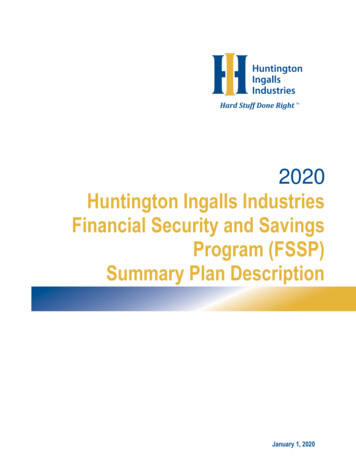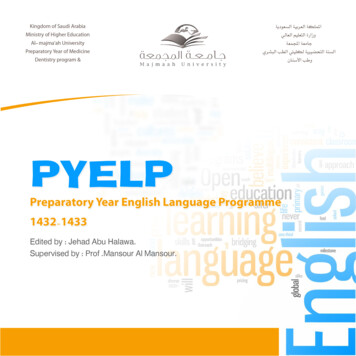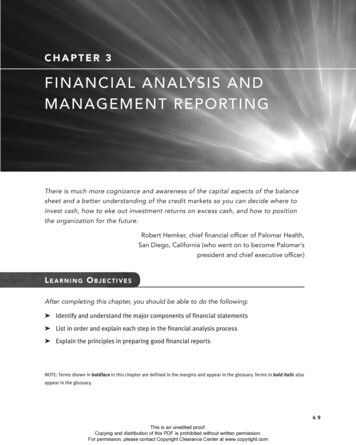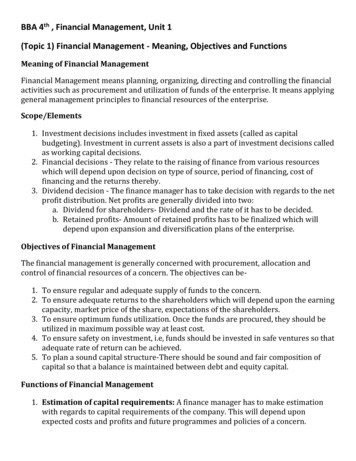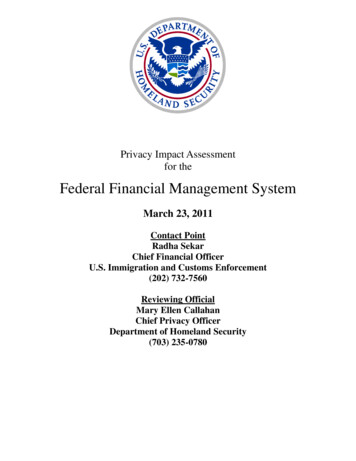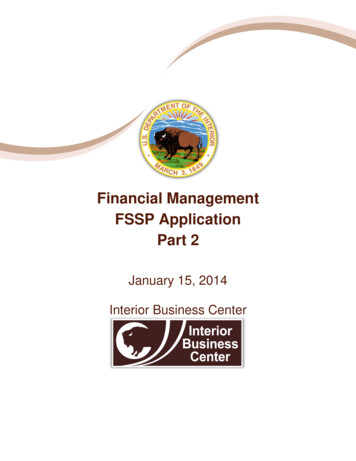
Transcription
Financial ManagementFSSP ApplicationPart 2January 15, 2014Interior Business Center
SECTION I - BACKGROUND INFORMATION1. EXECUTIVE DEPARTMENTDEPARTMENT OF THE INTERIOROFFICE OF POLICY, MANAGEMENT AND BUDGETINTERIOR BUSINESS CENTER (IBC)2. ORGANIZATION CHARTSInterior BusinessCenter2 PageIBC FSSP Application- Part 2January 15, 2014
3 PageIBC FSSP Application- Part 2January 15, 2014
3. TRANSACTION VOLUME – SUPPLEMENTAL FORM AThe table below lists actual transaction volume for FY13.Number of Transactions (in thousands)FY13Accounts PayableAccounts PayableAccounts GovernmentalIntra-GovernmentalTravel AccountingCharge CardAccountingUnits16.8541.05# of obligations# of invoice payments (at the invoice level).37# of receivables19.84.03313.31N/A – IBC pays a master bill; we do not trackindividual credit card charges# of billings# of collections# of travel reimbursements# of credit card chargesCOMMENTS:The transaction totals provided in this table include only those transactions processed at the IBC by theAccounting Operations Services Division for customers whom we support on Oracle Federal Financials (OFF).This does not include system generated transactions, transactions generated from interfaces or transactions thatare processed by customers utilizing OFF who enter their own transactions.4 PageIBC FSSP Application- Part 2January 15, 2014
3. FTE EMPLOYMENT – SUPPLEMENTAL FORM BProvided below is FTE data by the groupings and definitions listed in Appendix B, Financial ManagementProducts & Services Catalog, for FY13.FY13Government FTEs43.5No. of Contractors27.0Technology Hosting and Administration8.20Application Management Services1.03.0Systems Implementation Services1.06.8Management & Administrative (overhead)5.50TOTAL59.236.8Financial Management ServicesCOMMENTS:The IBC, in partnership with DOI’s Office of the Chief Information Officer (OCIO), provides the hostingfacilities, network infrastructure, enterprise system management capabilities, disaster recovery/COOPcapacity and security services necessary to deliver a comprehensive financial management managed service toits clients. The FTEs included in the table are for IBC Financial Management Directorate employees andcontractors only and do not include the OCIO employees and contractors.5 PageIBC FSSP Application- Part 2January 15, 2014
3. CURRENT CUSTOMERS – SUPPLEMENTAL FORM CThe table below provides a list of all current IBC customers. This includes those to whom we are currentlydelivering services as well as those with whom we are in the process of SSP Discovery and implementation.What services from are youcurrently delivering to thiscustomer? If you areproviding all of the servicesin a grouping just list thegrouping here.OFF Hosting/O&MTDY Payment ProcessingBureau /Component /Commission /BoardWhat calendaryear did thisorganizationbecome acustomer?American BattleMonumentsCommissionN/A2010Court Services andOffenderSupervision AgencyN/A2006OFF Hosting/O&MRegulatory ReportingGeneral AccountingFederal RetirementThrift InvestmentBoard/Thrift SavingsPlanN/A2006Federal LaborRelations AuthorityN/A2006Federal TradeCommissionN/A2007OFF Hosting/O&MRegulatory ReportingGeneral AccountingFinancial StatementsVendor PaymentsTDY PaymentsOFF Hosting/O&MeTravelRegulatory ReportingGeneral AccountingFinancial StatementsVendor PaymentsTDY PaymentsPCS PaymentsDebt ManagementBillings and CollectionsOFF Hosting/O&MGeneral AccountingVendor PaymentsTDY yOFF Hosting/O&MeTravelRegulatory ReportingGeneral AccountingFinancial StatementsVendor PaymentsTDY PaymentsPCS PaymentsDebt ManagementBillings and CollectionsList the customer point ofcontact, including name,organization, title, emailand phone numberChristine PhilpotChief Financial Officerfantc@abmc.gov(703) 696-6323Paul Girardo,Director, Office of FinancialManagementpaul.girardo@csosa.gov(202) 220-5718Susan CrowderChief Financial OfficerSusan.crowder@tsp.gov(202) 942-1615Kevin SmithBudget DirectorKasmith@flra.gov(202) 218-7945Valerie GreenDeputy Chief FinancialOfficervgreen@ftc.gov(202) 326-2901Chantale WongVP, Admin & Financewongcy@mcc.gov(202) 521-7878 orEric RedmondAssistant Deputy ChiefFinancial OfficerAdministration & Financeredmondeg@mcc.gov(202) 521-36766 PageIBC FSSP Application- Part 2January 15, 2014
What services from are youcurrently delivering to thiscustomer? If you areproviding all of the servicesin a grouping just list thegrouping here.OFF Hosting/O&MeTravelVendor PaymentsTDY PaymentsOFF Hosting/O&MeTravelVendor PaymentsTDY PaymentsPCS PaymentsBillings and CollectionsOFF Hosting/O&MRegulatory ReportingFinancial StatementsGeneral AccountingOFF Hosting/O&MReportingBureau /Component /Commission /BoardWhat calendaryear did thisorganizationbecome acustomer?National LaborRelations BoardN/A2003NationalTransportationSafety BoardN/A2003Public DefendersService for theDistrict of ColumbiaN/A2004Pretrial ServicesAgency for theDistrict of ColumbiaN/A2006Selective ServiceSystemN/A2005U.S. Department ofTreasuryDebtManagementServices2008U.S. InternationalTrade CommissionN/A2006OFF Hosting/O&MeTravelU.S. Office ofSpecial CounselN/A2006U.S. Trade andDevelopmentAgencyN/A2004OFF Hosting/O&MeTravelRegulatory ReportingFinancial StatementsGeneral AccountingVendor PaymentsOFF Hosting/O&MeTravelRegulatory ReportingGeneral AccountingFinancial StatementsVendor PaymentsTDY PaymentsAgencyOFF Hosting/O&MeTravelRegulatory ReportingFinancial StatementsGeneral AccountingOFF Hosting/O&MList the customer point ofcontact, including name,organization, title, emailand phone numberRonald CrupiChief Financial OfficerRonald.crupi@nlrb.gov(202) 273-3884Steven GoldbergChief Financial Officergoldbes@ntsb.gov(202) 314-6212Leslie GeraldChief Financial Officerlgerald@pdsdc.org(202) 824-2572Wendy MillerChief Financial OfficerWendy.miller@psa.gov(202) 220-5680Roderick HubbardChief Financial OfficerRoderick.hubbard@sss.gov(703) 605-4022Cynthia WinterDirector of ) 874-7084John AscienzoDirector, Office of FinanceJohn.ascienzo@usitc.gov(202) 205-3175Karl KammannDirector, Management andBudget Divisionkkammann@osc.gov(202) 254-3627Peggy PhilbinDeputy Directorpphilbin@ustda.gov(703) 875-42967 PageIBC FSSP Application- Part 2January 15, 2014
What services from are youcurrently delivering to thiscustomer? If you areproviding all of the servicesin a grouping just list thegrouping here.Billings and CollectionsOFF Hosting/O&MBureau /Component /Commission /BoardWhat calendaryear did thisorganizationbecome acustomer?Non-disclosedAgencyDistrict of ColumbiaCourtsN/A2011N/A2013Implementation of OFF withContract LifecycleManagement in process.Department ofHomeland ionSecurityAdministration;U.S. CoastGuard2013Discovery; to includerequirements gathering and fitgap analysis.AgencyList the customer point ofcontact, including name,organization, title, emailand phone numberConfidentialDana FriendFiscal and Chief ristine RodriguezAssistant Director, Office ofFinancial ManagementFinancial ManagementSystems Branch, OCFOchristine.rodriguez@hq.dhs.gov202-447-09768 PageIBC FSSP Application- Part 2January 15, 2014
3. COST SUMMARY – SUPPLEMENTAL FORM DThe table below provides a cost summary of our financial management services for FY11, FY12 and FY13.O&MImplementationsUpgradeOperational CostsTotal Costs:FY11 18.41 3.30 0.71 5.61 28.03Summary of Financial ManagementServices Costs (in millions)FY12 15.51 5.53 0.81 6.15 28.00FY13 8.21 0.63 0.34 5.02 14.20COMMENTS:Planning and Development, Modernization and Enhancement (DME) costs are not provided in this table.Upgrade costs are borne by the customer. New customer implementations at the Interior Business Center arefunded by the customer and are not considered DME; they are considered to be O&M and are broken out asprojects.9 PageIBC FSSP Application- Part 2January 15, 2014
3. FINANCIAL MANAGEMENT SYSTEM –SUPPLEMENTAL FORM EThe embedded Excel document below provides details on each financial management system that the InteriorBusiness Center is using to meet its mandatory financial management requirements.FinancialManagement Systems10 P a g eIBC FSSP Application- Part 2January 15, 2014
4. EXHIBIT 300 SUMMARYNew customer implementations at the Interior Business Center are not considered Development,Modernization and Enhancement (DME); they are considered to be O&M and have beenreported as O&M in our Exhibit 300 submission. Furthermore, these costs are designated asproject costs within our O&M reporting. Our Oracle Federal Financials solution is a commercialoff-the-shelf (COTS) product and we refrain from customized development. Consequently, theIBC does not submit any DME information with our Exhibit 300. When a customer has arequirement outside of IBC’s standard offering, the IBC works with the customer to meet theirneed through use of an interface or module in the offering not previously used or by addingextensions.5. FIPS 199In accordance with FIPS 199, IBC’s OFF system is classified to be a moderate risk system.6. FINDINGS/MATERIAL WEAKNESSWithin the past year there have been no material weaknesses, significant deficiencies orreportable conditions on A123 reviews, financial statement audits, or SSAE 16 reviews. OneNotice of Findings and Recommendations (NFR) on a single customer’s financial statementaudit was directly related to IBC accounting operations, not the Oracle Federal FinancialsSystem. The situation was resolved before the NFR was issued.7. QUALITY ASSURANCEThe IBC complies with the Federal Information Security Management Act of 2002 (FISMA) andfollows the same process as the Department of the Interior and the U.S. Department of Justice.The IBC has implemented Continuous Monitoring, as defined by the National Institute ofStandards and Technology's (NIST) Risk Management Framework, for the past 18 months.Certified Information Systems Security Professional (CISSP) is an independent informationsecurity certification for individuals, not organizations. There are currently at least two federalemployees within the IBC Financial Management Directorate (FMD), directly involved inmanaging Quality Assurance (QA) related projects that hold the CISSP certification.Additionally, IBC has its own Financial Management Certification Program. Approximately 25GS-501 series IBC FMD employees have been through this program. The majority of FiscalServices personnel have received this certification, as has the lead member of the QualityAssurance (QA) Section Internal Control Audit Liaison (ICAL) team.11 P a g eIBC FSSP Application- Part 2January 15, 2014
8. TRACKING COMMON AWARD IDNon-CLM Oracle Federal Financials Clients: The IBC Oracle E-Business Suite (EBS)provides an integrated solution with the inherent functionality to allow tracking of an Award IDinput into the system through all related transactions and between sub modules. Users have theability to track the Award ID through the grant and procurement processes as well as thedifferent stages of accounting. Oracle EBS allows users to query related transactions by AwardID through online workbenches and using reporting and query tools. For example, users cantrack an Award ID from a related commitment through obligations, invoices and payments byaccessing the application or run various queries to tie activity/transactions by Award ID.Some IBC clients use external contracting systems. Award IDs generated in external systemsmust be manually input or imported into the Oracle E-Business Suite to allow tracking forprocesses completed in Oracle. If the same Award ID generated in the external system is notinput into Oracle EBS, a cross walk would be required to track activity for the Award.Oracle enhancements to provide reporting in the new Payment Automation Manager (PAM)format will allow Treasury reporting to include Award ID.CLM Oracle Federal Financial Clients: The IBC’s solution leverages Oracle E-Business Suite.With Oracle Contract Lifecycle Management for Public Sector (CLM), EBS includes a federalcontract management system in the same application as the core financial system – OracleFederal Financials. Therefore, the Common Award ID is obtained because one transaction servesas both the Contract (in the contract management system) and the Purchase Order (obligatingdocument in the financial system). A single transaction record is stored in a solitary table,PO HEADERS ALL, with a single identifying number, to represent both the conformedcontract and the obligating instrument. Multiple contract modifications exist that contribute tothis conformed contract; however, the modifications have their own number, which uses thesame contract number (both the contract number visible to vendors and the internalPO HEADER ID that is referenced in the database). In summary, the IBC provides the ability totrack a common Award ID among the procurement and financial management systems by usinga single application to meet both procurement and financial management requirements, using onetransaction to meet both requirements.12 P a g eIBC FSSP Application- Part 2January 15, 2014
SECTION II – EVALUATIONQuestion 1. - Describe the Applicant’s model for offering services to customers (e.g.,bundling transaction processing with system support, requiring that particular mixedsystems be adopted in addition to the financial system).The IBC offers all customers our core foundation of Oracle Federal Financials (OFF). This fullyintegrated enterprise resource and planning (ERP) application provides flexibility of functionalmodules, yet allows our potential customers to pick and choose which modules meet theirindividual financial service needs. We work with potential customers on their businessrequirements and offer integrated system module solutions based on their information. If acustomer has a requirement for a procure-to-pay solution, we offer the combination of modulesto meet that requirement. If, for example, the customer does not have a requirement to performbudget execution, the IBC would not offer the budget module to them as an initial solution, but itcould always be added to their specific configuration in the future if they determined the need.The preconfigured core OFF solution comprises the following Oracle E-Business Suite modules:Federal Administrator, iProcurement, Purchasing, Payables, Fixed Assets, Accounts Receivable,General Ledger and a fully Federalized Discoverer reporting tool. In addition, the OracleContract Lifecycle Management procurement option is available, which we promote for a fullyintegrated procure-to-pay solution. This is offered as part of our core solution, but also as asingle service. The IBC can enable other Oracle modules, such as Project Costing and Billing, ifthe client solution requires them.Our mandatory services included with our core solution are the hosting and operations andmaintenance support of the application; initial training and base reports; functional and technicalsupport at the 1, 2, and 3 support levels; call center or helpdesk; management of the Oracle R12Core financial licenses; and maintenance of all operations and batch processing and associatedrequired interfaces (payroll, integrated charge cards, and Treasury disbursements).The IBC offers options to our customers to support and interface with third parties and managethose connections to our facility. We share previously designed interfaces and reports with ournew customer base. In addition, if a new customer requires functionality not currently in place tomeet their needs, all existing customers benefit from our development and implementation of thenew process. For example, if the IBC is required to create a new interface to a third party vendor,the interface becomes available to any customer (current or future) who uses that same serviceand service provider. This is true for custom report development as well: the designed report ismade available to others to run against their own set of books.13 P a g eIBC FSSP Application- Part 2January 15, 2014
IBC Oracle Federal Financials ortHR ServicesAcquisitionSupportFederal Administrator, iProcurement, Purchasing, Payables,Fixed Assets, Inventory, Receivables, and General LedgerHosting, O&M, initial training, base reports, help desk, licensesmaintenance, operations and batch processing, interfaces(payroll, charge cards, Treasury disbursements)OptionalFunctionalityand ServicesTypicalFunctionalityMandatoryThe IBC offers a full array of accounting operations services for transaction-based processing.The offering allows our customers to pick and choose which services they require from a cadreof services. The IBC staff are fully trained in our core solutions in the accounts payable andfunds control, receivables/reimbursable accounting and collections processing, cost management,regulatory reporting, financial statement preparation, audit liaison reporting, property andinventory management reporting, general accounting services, and PCS Travel. The IBCprovides these services in concert with our offering to allow our customers to use their resourceson mission specific tasks.Aside from the IBC’s Financial Management line of business service offerings, we also offer ourHuman Resources and Acquisition services. We have many customers who use portions of theseother services and further benefit from IBC being a one-stop shop. Our offerings complementeach other. Those who use our payroll operations and core finance system maintain one dataconnection to the IBC, which reduces the number of interconnections and security concerns.Another way our customers take full advantage of the benefits IBC offers is through additionalservices from our IBC/OCIO. For example, our hosting services allow our customers to reducedatacenter requirements and move to a state-of-the-art operation. This provides options to ourcustomers by allowing them to have even greater savings on avoidance of maintaining internallyhosted solutions.14 P a g eIBC FSSP Application- Part 2January 15, 2014
The current configuration of our offering is contained within a single instance of the application.Customers are co-located in a single database but separated by a “set of books,” allowing secureseparation of data based on access roles. Within our Core foundation software we offer thedifferent Oracle modules and some configurable tables, such as acquisitions, asset management,reporting and payables. These modules are part of the Core foundation software but are licensedand managed separately. As an example, one customer chose to use the fully integratedacquisition module in our solution, CLM, instead of using an externally hosted acquisitionsystem and managing an interface into the financial system. The IBC has another customer whois authorized to print checks, so functionality was enabled to ensure they could do this whileusing the same core foundation software. The different modules are only turned on for thosecustomers who have a requirement to use the functionality offered in the module. The IBC onlyincorporates the use of extensions where the Core foundation software does not meet the needsof the customer. The IBC will not allow any customization in our Core software. This assuresIBC customers that our offering is fully supported by Oracle and with upgrades and patching,thus keeping costs to a minimum.Some additional services include eTravel System interfacing, payroll interfacing andprocurement card support. The IBC has preconfigured interfaces to both ETS and ETS2 eTravelproviders. Our Subsidiary Systems Section provides level two support for users of these services.IBC has preconfigured payroll interfaces with all three civilian payroll providers. We have manyof the current bank card providers configured to batch interface with our Core solution. The IBCalso supports custom report development and file extractions. In addition, IBC is looking toimplement Treasury's Invoice Payment Platform (IPP) for any customers who choose to use thisoption.We allow our customers to take advantage of the many options necessary to meet their currentand future business needs. While IBC's solution is tailored to meet a customer’s needs, we aredoing so in a preconfigured standard commercial off-the-shelf product.The IBC encourages agencies to take advantage of the solutions already built and discouragescustomers from continuing to support outdated or legacy systems in lieu of taking advantage of afully integrated solution. The cost and resources devoted to the maintenance, management,security, oversight and reconciliation of an externally hosted system is the sole burden of thecustomer. IBC fully supports using interfaces into the Core solution, but does prohibit directconnection or interfaces into our systems that alter the security boundaries of our solution.The IBC supports many prebuilt interfaces with many third party vendors and supports webservices as part of those interface solutions. However, we want our customers to avoid externalantiquated systems where the functionality could be met within the Core OFF offering as part oftheir overall solution. We fully understand that a customer’s fees and collections system hostedinternally may support other areas of their agency, but an analysis should be done to see if the15 P a g eIBC FSSP Application- Part 2January 15, 2014
Core solution offered by IBC allows for that same collection and reporting ability and helps ourcustomers avoid any additional costs for hosting and maintaining those home-grown systems.Another reason for our discouragement of feeder systems is the ever-changing environment ofour Oracle software. As we continue to apply application patches and software release upgrades,our customers are responsible for any corresponding changes required in the interface for newfields or functionalities. Bottom line: We discourage the use of feeder systems because it savescustomer resources.The IBC does not prohibit our customers from using Prism for their acquisition solution, but inthose cases we provide batch interfacing to the financial system. Our CLM offering is a fullyintegrated procure-to-pay system that provides for a robust acquisitions system integrated withthe finance system. This solution offers real-time funds control for our CLM users. The IBC hasseveral customers who use externally hosted acquisitions systems and use batch interfacing, oreven manual input, to maintain obligations in the core solution. The IBC CLM team hasdemonstrated the tool to our current customers and their procurement offices to engage inconversation about using the ERP solution and the cost avoidance it provides versus externallyhosted applications. CLM is relatively new in the Oracle ERP solution and most agencies havenot seen or heard enough about this product to make a decision to migrate to CLM. The IBCcontinues to respond to customer inquiries about CLM and will support our customers inwhatever they decide about CLM.The IBC will continue to take the shared common instance approach. In a recent discovery effortwith a cabinet level agency, we mutually determined that their critical requirements required anupgrade to R12.2, along with prerequisite patching. In order to reduce risk and meet therequirement, IBC plans to implement the cabinet level agency on a R12.2 environment and thenmigrate the smaller agencies to the upgraded environment. The management of associated riskswill be handled similar to when the IBC migrated from R11 to R12. We will use risk mitigationplans, communication plans, budget planning, change control and executive oversight to managethis migration. When completed, this upgrade will provide additional functionality for ouroffering.Both instances will benefit from the features of the IBC hosted solutions with the same supportmodel, reducing the risk to current customers and the potential new customer. Our proposedsolution, though appears to be reverse of our common-instance logic, allows for the increasedcustomer base, shared costs and reduced risk to all parties concerned. It is not IBC’s intent tocreate separate instances for each cabinet level agency, but it is our intent to provide assurancesto both our current customers and our potential new cabinet level agency that we do notintroduce risk to already financially strapped federal customers. The IBC will follow its provenmethodology when moving the potential new customer onto our landscape. This migration pathis what we can accomplish over time, with reduced risk and costs to our customers.16 P a g eIBC FSSP Application- Part 2January 15, 2014
Question 2. Describe the Applicant's current financial system environment. In particular,describe: the architecture of the Applicant’s financial management system and itscomponents, including the application, database, computing platform, storage, network,and interfaces; how it is designed to virtually partition its data and configuration for eachcustomer (multi-tenancy); how it is set up to ensure continuity of service and recovery fromdisasters; and what the peak throughput is at the application, database, server, network,and storage layers.The IBC, in partnership with DOI’s Office of the Chief Information Officer, provides the hostingfacilities, network infrastructure, enterprise system management capabilities, disasterrecovery/COOP capacity, and security services necessary to deliver a comprehensive financialmanagement managed service to its clients. The IBC, from the beginning of our engagementwith DHS, has been collaborating with a team of more than a dozen experts in the IBC/OCIOwho have demonstrated experience providing a modern, agile, secure and reliable hostinginfrastructure.The IBC/OCIO supports a wide variety of application architectures across multipleenvironments, including single-host systems, multi-node client/server systems, and multi-tieredWeb based systems. IBC/OCIO currently manages a mainframe computer, 932 UNIX, hosts(61%virtualized), and 200 INTEL/AMD processors and 735 Windows Servers (26%virtualized). The IBC/OCIO architecture includes a Storage Area Network (SAN) with acapacity of over a petabyte of storage, which equates over a million gigabytes of data. Thecurrent IBC/OCIO offering at both datacenters host the current IBC offerings of OFF, ourpayroll systems, the DOI bureau-wide Finance system, OPM, eOPF and many other systems.This storage pool allows the sharing of peripheral storage devices (for example, disk arrays andtape silos) across all server platforms ensuring the availability of high performance, readilyavailable storage to all server environments at the lowest available unit cost.The IBC provides sophisticated hardware, high-end infrastructure, and expert personnel toensure all open systems supported by IBC are delivered with simplicity, speed, and maximumavailability. We offer a comprehensive end-to-end service model, providing a full-servicedatacenter, in compliance with Statement on Standards for Attestation Engagements (SSAE) No.16 Reviews and OMB A-130 Guidance. In addition we provide comprehensive hardware,software and network support and provide complete application management support includingperformance monitoring, performance tuning and a comprehensive patch management program.The IBC administers applications 24 hours a day, seven days a week.The IBC currently offers a shared single production instance that currently contains 16 federalagencies, each separated by a “set of books.” This logical partition allows the data to coexist in asingle database and remain separate at the agency level.17 P a g eIBC FSSP Application- Part 2January 15, 2014
Our shared model is the standard for all of our existing and new clients. Onboarding customersare encouraged to make changes to their existing processes to work with our shared model, as wedo not do software customizations.The IBC works with our Oracle and IBC/OCIO on a routine basis for evaluations of ourofferings, configuration and use of the various tools in the industry. With the collaboration ofour teams, the IBC implemented software tools for compression and portioning which improvedour offerings ability in both on-line response time and reporting time. We worked with Oracleand others in our approach to cabinet level agencies. It is with collaboration with our IBC/OCIOand Oracle and other technical and software providers that the IBC can continue to improve ouroffering in a cost conscious approach.During the discovery process with our first cabinet level agency, IBC determined that, in order tomeet a number of the agency’s critical requirements, an upgrade to Oracle R12.2, along withprerequisite patching, is necessary. Therefore we plan to implement the cabinet level agency onOracle R12.2 and upgrade our existing customers in phases. Based on scheduling and fundingconsiderations, we anticipate that within the next few years we will have all customers operatingin a single environment on R12.2.To avoid risk and additional support cost with the Oracle COTS package, the IBC does not allowsoftware customization. Where gaps exist, we work with our private sector partner and ourfederal staff to provide solutions through business process reengineering or extensions. Thisprocess allows the IBC and our customers to take full advantage of our standard solution offeringand fill business process gaps. As these extensions are created, all customers benefit from theiruse to fill business needs. A prime example of this is the work IBC completed with GTAS andthe lack of full financial statement reporting. The IBC and our partner created a process toproduce a critical report for our cus
Accounts Payable Accounts Payable 16.85 # of obligations Accounts Payable 41.05 # of invoice payments (at the invoice level) . Accounting Operations Services Division for customers whom we support on Oracle Federal Financials (OFF). . Oracle enhancements to provide reporting in the new Payment Automation Manager (PAM) IBC FSSP Application .
